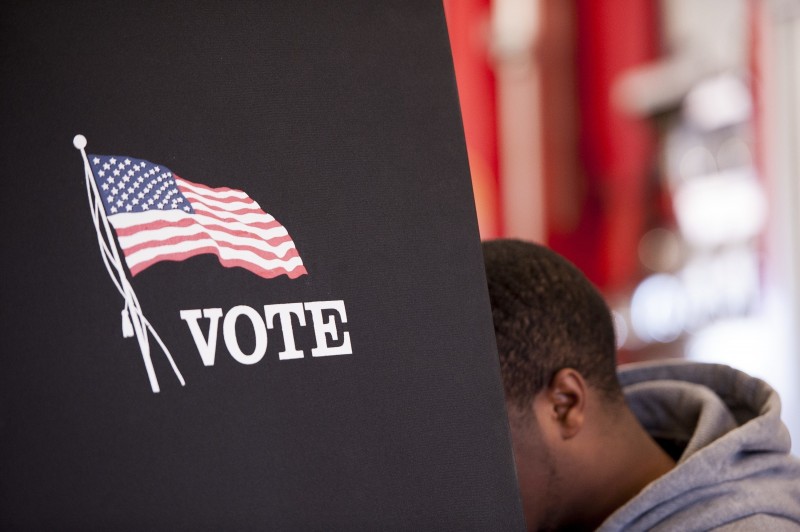One year out from the 2016 general election, voters in off-year races across the country on Tuesday offered some signs of things to come — and presented the presidential candidates with tea leaves to read as they sharpen their campaign strategies.
By evening’s end, Republicans were the ones crowing, as they scored a surprise win in a hotly contested governor’s race in Kentucky while keeping control of the state Senate in Virginia, despite a big spending onslaught from former New York Mayor Michael Bloomberg’s gun-control group.
“Tonight was another key test for Dems, Clinton, and their party’s field [organization] and once again they failed to deliver,” Republican National Committee Chairman Reince Priebus tweeted shortly before midnight.
By contrast, Democrats were a little on the quiet side. A stinging defeat in Houston, where voters rolled back an ordinance that had expanded nondiscrimination protections to LGBT people, illustrated the risks attached to ballot initiative tactics that the party has increasingly used as a means of advancing its policy goals when blocked by the GOP.
Here are takeaways from Tuesday’s results and what they mean for 2016:
Kentucky and Obamacare
The tea party scored a significant win in Kentucky, where one of its own, Matt Bevin, overcame a late deficit and a series of missteps on the stump to defeat Democratic Attorney General Jack Conway by a handy margin, 53% to 44%. Bevin, who has promised to dismantle the state’s successful Obamacare exchange, will now have that opportunity.
A disaster for President Barack Obama’s signature initiative? Not quite. Supporters of the Affordable Care Act believe that Republicans could face a backlash if Bevin goes ahead with his pledge.
“He’s the dog who caught the car,” one Democratic strategist told CNN, “and I think he’s going to have a real problem using up all of his political capital taking health care away from 400,000 of his constituents.”
In fact, toward the end of the campaign, Bevin had already begun to soften his rhetoric against the state’s Medicaid expansion under Obamacare.
But Republican consultant Liz Mair sees the wealthy businessman’s win as the latest sign that any attachment to the controversial program — which the Democrat candidate had planned to preserve — is still poison at the polls.
“Last night seems to continue to evidence that Obamacare is a big liability and is a problem for people who are running on it,” she said, “and people who are associated with it by virtue of their partisan identity.”
Virginia’s mixed bag
The commonwealth has been caught between a Democratic governor, Clinton pal Terry McAuliffe, and a heavily Republican state House of Representatives. But its state Senate entered Tuesday very much up for grabs.
In the end though, the GOP retained its advantage — and its ability to handcuff the Democratic administration from pursuing its legislative agenda.
That includes a push for stricter gun-control laws, which have become a staple of Hillary Clinton’s pitch to more liberal Democratic primary voters.
Bloomberg’s “Everytown for Gun Safety” group, which sunk millions into the Virginia contests to wrest control of the state Senate, took heart from one high-profile victory. In the state’s 29th district, voters tapped a Democrat, Jeremy McPike, who was backed by $1.5 million in advertisements from Everytown, including one featuring Andy Parker, the father of slain local news reporter Alison Parker.
“Gun safety prevailed on the NRA’s home turf because we made sure that every voter knew where the candidates stood on gun safety,” Everytown president John Feinblatt said in a statement.
The win, he added, is “just the latest example of how candidates are paying the price for being out of step with Americans who demand that their leaders take action to prevent gun violence.”
Reading into the referenda results
If Republicans won the most notable contest of the off-year 2015 Election Day in Kentucky, Democrats scored a number of lower-profile but potentially significant victories through ballot initiatives.
Democrats and supporters of campaign finance reform won hard fought and expensive battles in Seattle and Maine, where voters boosted initiatives to amp up public financing of elections.
“We as a movement have not had a great example to point to when people ask what kind of reform are you talking about, what is the actual path forward,” said Szelena Gray, a co-founder of Run for America, which seeks to draft fresh faces into politics. “We often have to speak in vague terms because there aren’t a lot of solutions to point to and say this is working really well, let’s grow this.”
But with Tuesday’s vote, she said, the sale became a whole lot easier for more liberal candidates like Clinton and Bernie Sanders.
“With the actual first passage of the ballot for ‘democracy vouchers’ in Seattle, you’ve taken something that up until now is just a concept, a theory and turned into something we can point to very concretely and say, ‘Here is what the systems looks like, here is how it’s working’,” Gray said. “We now have the ability.”
The elections weren’t about 2016
Even as Republicans dole out the virtual backslaps to Bevin in Kentucky and point to the results in Virginia as proof gun control advocacy is a dead end for Clinton, Election Day 2015 may not provide much of a crystal ball at what’s to come over the next 12 months.
Case in point: The winner of Kentucky’s attorney general race? Andy Beshear, a Democrat and son of the outgoing governor, a major champion of Obamacare.
